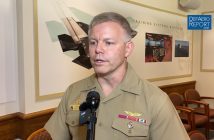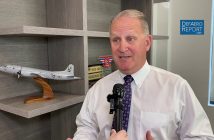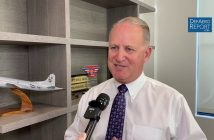Jeff Miller, corporate senior Vice President and president ISR systems segment discusses new contracts, future programs that are being pursued, and international growth in the middle east during an interview with Defense & Aerospace Report Editor Vago Muradian at the 2018 AUSA Annual Meeting in Washington, DC. Our AUSA coverage is brought to you by Bell, a Textron Company, Elbit System of America, L3 Technologies, Leonardo DRS, and Safran.
Jeff Miller
President of ISR Systems, L3 Technologies
AUSA Annual Meeting
October 2018
Vago Muradian: Welcome to the Defense and Aerospace Report. I’m Vago Muradian here at the Association of the United States Army’s Annual Conference and Trade Show in Washington, DC, the number one gathering of senior U.S. Army leaders from around the world to talk about the future of the service, its budgets, its technology, doctrine and more. Our coverage here is sponsored by Bell, a Textron company; Elbit Systems of America; L3 Technologies; Leonardo DRS; and SAFRAN.
We’re over here on the L3 stand to talk to Jeff Miller who is the new President of the Intelligence, Surveillance, Reconnaissance Systems segment of the company. Part of Chris Kubasik’s drive to take the company to the next level in terms of growth, but also the sixth prime strategy that we talked to him about. Jeff, congratulations and thanks very much for the time.
Jeff Miller: Thank you, I appreciate it. It’s great to be here. It’s been a great show for us so far. A lot of traffic, a lot of interest in in everything we’re doing at L3 Technologies. I appreciate the opportunity to talk to you about it.
Mr. Muradian: It’s great. I had a chance to talk to one of your folks over at SOFIC when you guys had won a very, very key U.S. Army order. That’s going into production now. So there’s some good money there, nearly a billion dollars. And you guys had another major win announced here on the first day of the show. So talk to us about both of these contracts and what they mean for you guys. It’s an awful lot of money and positions [inaudible]for future growth.
Mr. Miller: It’s great. The [EMBGB] program that we had announced earlier in the year that you talked about at SOFIC just recently received a $90 million award for the first production year, so getting that moving forward for the Army is great. It’s a great example of how we approach the business. We talk a lot about being agile, innovative and mission focused. I think [EMBGB] is a great example. Understanding the user’s needs and bringing the Army a solution that under the new CFT structure they were able to bring to contract very quickly.
The other program you mentioned comes out of our WESCAM Division. WESCAM is one of our most well-known divisions in the company. It does great in all areas of surveillance. If you look around the show you’ll see even some ground combat vehicle surveillance programs we’re working. [Fixed up to work for them]. But the recent win was really in their [core], landing a $450 million program for the Army Shadow program, to add the MX-10 capability to that platform.
Great examples of what we’re really focusing on, and seeing great, great wins across the company in the new ISR segment.
You mentioned this being part of Chris’ drive and it’s absolutely true. L3 3.0, bringing the company a step forward, integrating more, collaborating more, that’s what you’re seeing. Bringing the ISR group together for me personally was great to see from a company standpoint. All of the capabilities that we have in the sensors group, combining that with the team and the aerospace group, primarily out of Greenville and Waco, but just a tremendous platform capability, tremendous sensor capability, bringing those two groups together. We’re now 14,000 people strong and we really can go compete at any level with any of the companies in the world to take on ISR solutions.
Mr. Muradian: Talk to us about what the next phase of that growth is and what the next targets are, what are the next competitions and programs you guys are pursuing because you guys are trying to get that mass and move up higher in the value chain.
Mr. Miller: Very broad-based, again. We have some core programs that we worked with the Air Force for a long time. Part of this show for us is really trying to drive more closely into Army relationships. A lot of activities going on to upgrade programs. Future vehicle lift programs. You know, we really look at the CFTs. That’s why our booth is set up today is to look at what the Army’s needs are. Future vehicle lift is a big one for us. Updating and maintaining Apache vehicles is another big step forward for us.
But we really have a very broad-based approach to growing the business, we’re organized into eight sectors right now. Each one of those is showing strong growth going into next year.
Trying to build up a little bit more international. When we were just the Sensors Group they ran at about 33 percent international. We’ve mixed those two together. Now we’re just under 20. I’d kind of like to see that get back up to the 30 percent range again. Doing a lot of work for that in ISR. And you may have seen recently Steve O’Brien joining the company as the head of our Business Development for the corporation, and just announcing a week or two ago that C.R. Davis is taking over the International office for us. It’s all part of that drive that we’re seeing across the company with those guys really helping to drive better collaboration into key countries throughout the world.
Mr. Muradian: And where do you expect to see most of your international growth? Have you guys got some sense on what that’s going to look like?
Mr. Miller: A lot of focus in the Mid-East right now. The Kingdom of Saudi Arabia has been a big customer for us. Again, we use WESCAM extensively for international business. They kind of lead the way for us. We have I think now 15 different service centers worldwide, so if you go to a country like Saudi Arabia the equipment is maintained in country. We’ve just done the same thing in the UAE. So for that reason, putting those service centers, certified service centers in place throughout the region, enabling each country to maintain their own equipment, has really given us a footprint in the Mid-East that’s enabled us to grow.
Australia’s also been significant for us, both on the night vision side and expanding into some cyber, electronic warfare capabilities. We’ve acquired a couple of countries there. We have a good reputation in Australia, so expanding there. And looking a little bit more into the Far East.
So those are the general regions we’re focused on right now.
Mr. Muradian: You mentioned the Cross-Functional Teams, the CFTs. The Army has gone to a Futures Command. Getting elements of the Training and Doctrine Command in there, a little bit of an acquisition flavor as well. But there are a lot of questions about what that means for the overall, how people do business with the Army. Where does the Cross-Functional Team process fit into how, you know, clearly the service and the Chief and the Secretary are looking at this to accelerate Army acquisition and make the organization more innovative. Then there’s a little bit of a concern of well wait a minute, where are the expert acquisition people in this process? I understand, we talked to Secretary Esper, he was very clear, look, we’re working our way through these challenges. But it’s important to sort of get to a new footing.
From the standpoint of somebody who is the President of an important business that does business with the Army, is there enough clarity as far as you’re concerned? Do you guys know how you’re going to be working with this new entity? I know that General Murray has been around here talking a little bit about that. Talk to us a little about what it means for you guys and how you do business with the customers.
Mr. Miller: It’s a great question, great topic. We’ve worked with the Army closely in discussions on the Future Center, and in fact over the last year we’ve done some exercise with them that helped us shape what we wanted to do and helped the Army think a bit about how they would approach the Future Center.
As you’ve seen, we’re talking today about the latest reorganization within L3. We’ve gone through a couple. We’re trying to evolve quickly. So working with the Army, we don’t expect that they’ve got all the answers worked out. We don’t have all the L3 answers worked out either. So it actually is great synergy for how we see things moving forward.
Again, over the last year we’ve looked at creating our own Soldier Innovation Center that we’re working with the Army.
We had a pretty good guess, did our own homework and guessed that Austin would probably be the home of that, and we’re currently buying real estate just outside of their facilities to put our own Soldier Innovation Center in. So it aligns perfectly with what we do.
One way to say it, it is a non-traditional way for the Army to look at business and what is L3 looking to be? The non-traditional sixth prime. That moving more quickly, understanding users’ needs, we tend to invest in our products so [EMBGB] is an example is a product we developed on our own money.
Our ability to work with something like the Future Center and the CFTs to understand those needs helps us shape our investment. That’s one of the ways we win our business, is we’re willing to invest more, particularly on the sensor side of the business.
So yes, there are still some things to work out for the Future Center. There are still some things for us to work out on our Soldier Innovation Center. I think the go hand in hand and it’s a great opportunity for us going forward.
Mr. Muradian: Jeff Miller, the President of the Intelligence, Surveillance, Reconnaissance Systems segment at L3. Sir, thanks very much and best of luck on the new business.
Mr. Miller: Thank you, I appreciate it. Have a good day.
-30-




